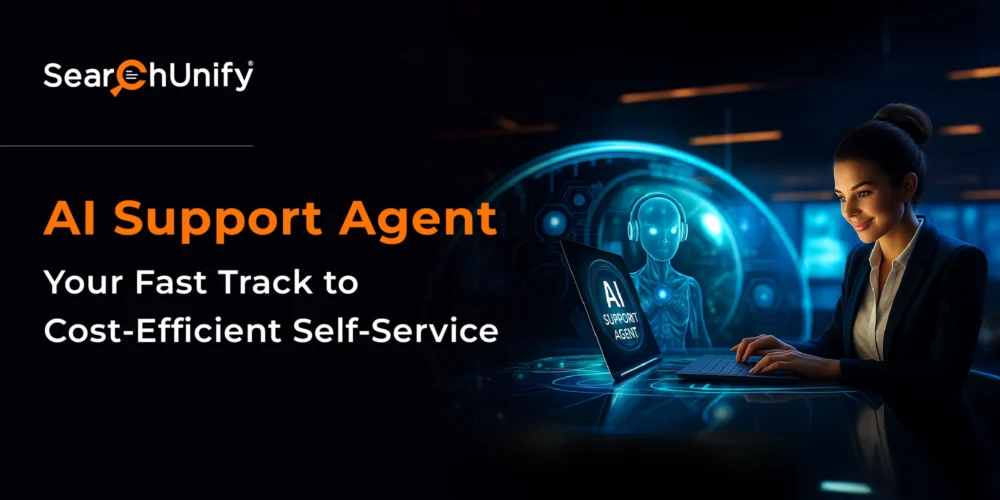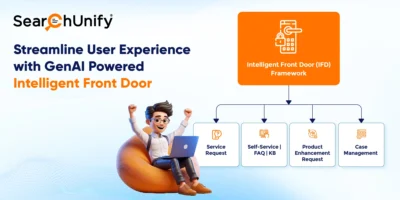
The support landscape is evolving. Customers demand for faster, smarter, and more intuitive self-service is at an all-time high. They don’t want to be stuck waiting in queues or navigating through outdated FAQs; they want quick and accurate answers.
To meet this rising demand while keeping operational costs in check, enterprises are increasingly turning to AI support agents for efficient self-service. The AI Support Agent is at the heart of this shift, quietly revolutionizing how businesses deliver exceptional self-service experiences.
This blog explains what the AI support agent is and why they lead the next-gen self-service.
Let’s get started!
What is an AI Support Agent?
AI Support Agent is an intelligent agent built to improve self-service. Unlike basic chatbots, they understand context and intent, access unified knowledge in real time, and deliver personalized, accurate responses instantly.
For instance, if a customer asks about a failed payment, an AI Support Agent can cross-reference billing history, product subscription, and knowledge base articles to offer a solution in seconds. This minimizes the need for agent intervention and ensures users get fast, relevant assistance. As a result, businesses can offer proactive, intelligent, and cost-effective support around the clock.
Why AI Support Agent is the Future of Self-Service
Self-service has moved from the sidelines to center stage in modern support strategies. However, traditional self-service models often lack the personalization, accuracy, and responsiveness today’s users expect.
Here’s why AI Support Agent is redefining what effective self-service looks like:
1. Personalized Interactions at Scale
An AI Support Agent can analyze user behavior, query patterns, and historical interactions to deliver contextual responses. Whether a user is facing a technical glitch or needs product information, the response is tailored, not templated. This level of personalization enhances the overall user experience and reduces frustration.
2. Instant Access to the Right Knowledge
By integrating with knowledge bases, product documentation, support histories, and even other external tools, AI Support Agent provides users with the most relevant answers, and that’s so quickly. For instance, if a user searches for “email not syncing,” the agent surfaces the most applicable solution based on device, email client, and previous interactions, eliminating unnecessary back-and-forth.
3. Significant Case Deflection
AI Support Agent resolves repetitive and low-complexity queries autonomously. This deflects a large portion of cases from reaching human agents, who can then focus on high-impact issues. Over time, this leads to faster resolution, improved agent morale, and substantial cost savings.
4. Smarter Than Traditional Chatbots
While traditional chatbots rely on rigid scripts and keyword matching, AI Support Agent is far more dynamic. They understand intent, context, and nuance, enabling meaningful conversations by leveraging NLP and sentiment analysis, not just canned replies. This leads to more accurate resolutions, less user frustration, and a significant improvement in self-service outcomes.
5. Data-Driven Support Optimization
Every interaction with an AI Support Agent generates insights. These include frequently asked questions, content gaps, and recurring issues. Such data helps support teams improve knowledgebase content, streamline workflows, and even inform product enhancements.
For instance, if many users are searching for a “reset password loop,” the support and product teams can investigate and resolve root causes proactively.
Curious how an AI Support Agent can transform your self-service game?
Let’s connectThe Domino Effect: Self-Service Done Right
The benefits of an AI Support Agent go beyond resolving tickets. They trigger a chain reaction that positively impacts the entire support ecosystem. Here’s how it unfolds:
- AI Support Agent → Smarter Self-Service
With contextual understanding and intelligent routing, this AI agent elevates self-service from reactive to proactive. - Smarter Self-Service → Higher Case Deflection
Customers find what they need quickly, reducing the need to raise tickets. - Higher Deflection → Less Agent Workload, More Focus on Complex Cases
Support teams can dedicate time and attention to solving high-priority issues that require a human touch. - Faster resolution + Better Experience → Higher Customer Satisfaction (CSAT)
When customers’ issues are resolved quickly and efficiently, they take notice and reward you with higher satisfaction scores. - Higher CSAT → Stronger Customer Loyalty & Retention
Satisfied customers are more likely to return, renew subscriptions, and recommend your brand to others. - Stronger Retention → Reduced Acquisition Costs
Acquiring a new customer is more costly than retaining one. Additionally, with loyal customers, you build a stable revenue base.
Simply put, AI agent-driven self-service is not just about doing support better; it’s about doing business better.
Conclusion
AI Support Agent is transforming self-service from a passive support model into a proactive, intelligent, and efficient engagement channel. They empower customers to solve problems on their own terms while freeing up support teams to focus on high-value tasks.
For businesses looking to scale support operations, reduce costs, and elevate customer satisfaction, this AI Support Agent is not just a trend; they’re the future. As customer expectations continue to increase, investing in smarter self-service isn’t just smart. It’s essential.










